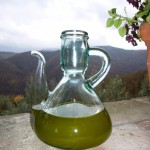Mediterranean Diet
What is the Mediterranean Diet?
The Mediterranean diet is a modern nutritional model inspired by the traditional dietary patterns of some of the countries of the Mediterranean basin, particularly Southern Italy, Greece, Cyprus, Portugal, Turkey and Spain. Is Mediterranean food healthy? Well, a main factor in the appeal of the Mediterranean diet is its rich and full flavored foods. But another appeal is that the Mediterranean diet is said to be a heart healthy diet. Studies have shown that people, who consume a Mediterranean diet, reduce their risk of death from heart disease and also cancer.
Mediterranean Diet – General Guidelines
The general guidelines of the heart healthy Mediterranean diet are as follows:
- Eat a lot of fruits and vegetables
- Use olive oil instead of butter or margarine
- Eat some nuts
- Eat fish and shellfish at least twice a week
- Drink red wine, in moderation
- Eat red meat a few times per month
Let’s find out more about each component.
Mediterranean Diet – Vegetables and Fruits
 Residents of Greece eat an average of nine servings a day of antioxidant-rich fruits and vegetables. You should eat a variety of whole fruits and vegetables every day, according to the Mediterranean diet. Strive for seven to ten servings a day. Always have bananas, apples or carrot around when you need a snack. Another way to increase your fruit intake is by eating more fruit salads.
Residents of Greece eat an average of nine servings a day of antioxidant-rich fruits and vegetables. You should eat a variety of whole fruits and vegetables every day, according to the Mediterranean diet. Strive for seven to ten servings a day. Always have bananas, apples or carrot around when you need a snack. Another way to increase your fruit intake is by eating more fruit salads.
Mediterranean Diet – Olive oil
 The Mediterranean diet discourages saturated fats and hydrogenated oils (trans-fatty acids), both of which contribute to heart disease. More than half the fat calories in a Mediterranean diet come from monounsaturated fats (mainly from olive oil). Monounsaturated fat doesn’t raise blood cholesterol levels the way saturated fat does.
The Mediterranean diet discourages saturated fats and hydrogenated oils (trans-fatty acids), both of which contribute to heart disease. More than half the fat calories in a Mediterranean diet come from monounsaturated fats (mainly from olive oil). Monounsaturated fat doesn’t raise blood cholesterol levels the way saturated fat does.
All types of olive oil provide monounsaturated fat, a type of fat that can help reduce LDL cholesterol levels, when used in place of saturated or trans fats. “Extra Virgin” and “Virgin” olive oils are the least processed forms, meaning they contain the highest levels of the protective plant compounds that provide antioxidant effects. Try olive oil for salad dressing and as a healthy replacement for butter or margarine.
Mediterranean Diet – Nuts
 According to a Spanish study, a Mediterranean diet enriched with nuts, could be helpful in managing metabolic syndrome, a collection of risk factors for heart disease such as belly fat, high cholesterol, high blood pressure and high blood sugar. Read more about the study in Archives of Internal Medicine December 8/22. Dr Jordi Salas-Salvad³, of the University of Rovira i Virgili in Spain.
According to a Spanish study, a Mediterranean diet enriched with nuts, could be helpful in managing metabolic syndrome, a collection of risk factors for heart disease such as belly fat, high cholesterol, high blood pressure and high blood sugar. Read more about the study in Archives of Internal Medicine December 8/22. Dr Jordi Salas-Salvad³, of the University of Rovira i Virgili in Spain.
Walnuts contain the healthy Omega-3 fatty acids that may improve the health of your blood vessels. Walnuts, pecans, almonds and hazel nuts, are low in saturated fat. Be aware that nuts are high in calories, so don’t eat more than a handful a day. For the best nutrition, avoid honey-roasted or heavily salted nuts.
Mediterranean Diet – Fish
 Fish is eaten on a regular basis in the Mediterranean diet. Eat fish and shellfish at least twice a week. Fish, especially “oily fish” such as salmon, is high in Omega 3 fatty acids, a type of polyunsaturated fat that can lower cholesterol and improve the health of your blood vessels. Water-packed tuna, salmon, trout, mackerel and herring are all healthy choices. Grilled fish tastes great, but you should avoid fried fish, unless it’s sauteed in a small amount of olive oil.
Fish is eaten on a regular basis in the Mediterranean diet. Eat fish and shellfish at least twice a week. Fish, especially “oily fish” such as salmon, is high in Omega 3 fatty acids, a type of polyunsaturated fat that can lower cholesterol and improve the health of your blood vessels. Water-packed tuna, salmon, trout, mackerel and herring are all healthy choices. Grilled fish tastes great, but you should avoid fried fish, unless it’s sauteed in a small amount of olive oil.
Mediterranean Diet – Wine
 Many Mediterraneans, drink wine with their meals. Studies have shown that if you drink wine in moderation it may reduce heart attack risks. Drinking in moderation means no more than one glass of wine a day for a woman and two for a man, according to the Mediterranean diet. Over-consumption can cause high blood pressure and weakening of the heart muscle. Studies suggest drinking purple grape juice can have the same beneficial effect as drinking wine and may be a healthier alternative for some.
Many Mediterraneans, drink wine with their meals. Studies have shown that if you drink wine in moderation it may reduce heart attack risks. Drinking in moderation means no more than one glass of wine a day for a woman and two for a man, according to the Mediterranean diet. Over-consumption can cause high blood pressure and weakening of the heart muscle. Studies suggest drinking purple grape juice can have the same beneficial effect as drinking wine and may be a healthier alternative for some.
Mediterranean Diet – Eat Less Red Meat
Residents around the Mediterranean eat less red meat than people in the US. Studies have shown that the saturated animal fat in red meat contributes to heart disease, atherosclerosis and colon cancer. Eat red meat a few times per month. Substitute fish and poultry for red meat, according to the Mediterranean diet. Avoid sausage, bacon and other high-fat meats.
Continue reading about the Mediterranean Diet Pyramid.

 Facebook
Facebook  Twitter
Twitter  RSS
RSS







